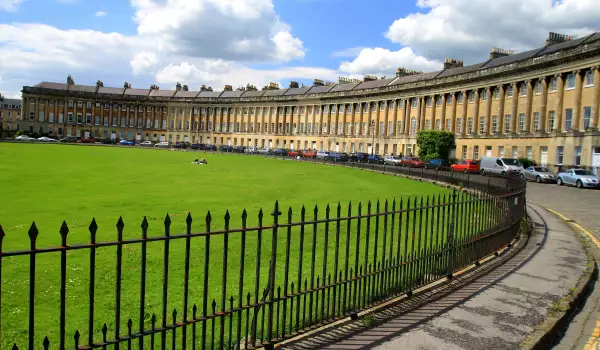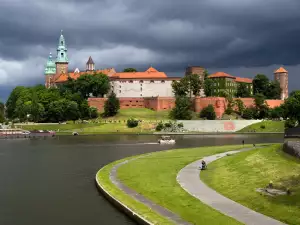Royal crescent in Bath

Royal Crescent is a magnificent building in the form of a C, which can be seen in the English city of Bath. Considered a masterpiece in architectural monuments in Britain, the Royal Crescent is an excellent and large example of Georgian architecture. Today, Royal Crescent and Bath the city are included in the UNESCO list of world historical and cultural heritage sites. The construction of the building is so impressive that for decades was one of the favorite places for film photos.
Built between 1767 - 1774 year by design of the architect John Wood the Younger, Royal Crescent in Bath is considered one of the best achievements of urban architecture in 18th century England as a peak of architectural style Paladin in Bath .
Originally the buildings comprising the Royal Crescent, which total 30 in number were provided for the royal guests who came to Bath for their vacations and holidays. For over 200 years this first class building houses a variety of celebrities.
Today it still has residential apartments, but most accounts for offices, a first-class hotel and an interesting museum.
Shape of the Royal Crescent in Bath is particularly intriguing in nature, it resembles a half - Colosseum. In fact at the heart of the English building also stand rows of Ionic columns, as in the ancient arena of death. Each column reaches about 76 meters in diameter as its size is 14. 3 meters. 114 Ionic columns are deployed in the facade of Royal Crescent, whose interior over the years and centuries has changed many times, but the external architecture can boast with its original appearance.
Interestingly, in the 18 century when the elite building was built, everyone to have a flat bought actually only part of the length of the facade. From then on he was entitled to find their own architect to build housing to the particular preferences and needs of the owner. Sometimes the property was divided into two houses, another time was only 1, etc. This commercial architectural priority or rather the consequence of it is visible at the rear of the Royal Crescent, which is a mix of levels, heights, architectural styles and ornamentation. Immutable and uniform, the facade remains, however.

Another curious fact is that with his father John Wood, the Elder, his younger son was very "deep" in Masonry. Focussed exclusively on Masonic symbolism and it is best seen as created by a young architect building the Royal Crescent and elevated by his father Circus, which shape is a symbol of the sun and moon (Soleil-Lune). These two buildings together with the Royal Square and Gay Street create a form that is also a Masonic symbol.
Today, visitors to the Royal Crescent are able to enjoy its unique architecture and beautiful opulent interior. No problem man here can sense how the nobility lived in the 18 century.
Each room has an exquisite example of Georgian interior design with authentic furniture , paintings , textiles and carpets.
The local museum is located in Bath, House No. 1 Royal Crescent. Since 1950 number 16 is converted into the guest house. In 1971 it merged with Number 15 and creates the exquisite Royal Crescent Hotel.















